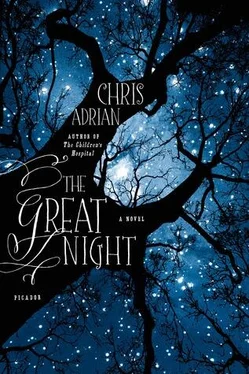She fell asleep, finally wondering if she should explain that she didn’t ordinarily do this sort of thing on a first date, let alone before dinner, and dreamed of her mother, who often made predictable visits whenever Molly had particular sorts of fun. They were having a girls-only session of home schooling, and she was quizzing them. “Who can tell me what a pussy face is?” she asked, and Malinda’s hand shot up. “A pussy face,” she said confidently, “is the face a weak man makes when he’s crying.”
“Exactly … wrong!” their mother said, and gave Malinda a smack with the back of her hand. “A pussy face,” she said, “is the convergence of a face and a pussy.” She went on to ask what you got when a pussy and a face converged, and Melissa answered, incorrectly, “A baby! A baby!” Honesty was the answer, and honesty was the subject of their lesson. It was like her mother’s real-world lessons for there to be a little mystery, at first, about what the subject was, and for the posters and learning aids to be covered up initially, though it was never with such a fantastic multicolored cloth as what her mother swept away in the dream. The heart of the lesson, which seemed to go on for hours and involve an endless show of orgasmic faces, was that men were only honest when they were having sex, and that there was an ancient witch’s art, to which she and her sisters were heir, of discerning a man’s intentions by gazing into his eyes as he ate you out. Those squinting Kilroy-Was-Here portraits were a whole other set of faces to examine, and Molly asked a question in the middle of the show. “But what does it mean,” she asked, because she remembered very clearly how in her darkening room Ryan’s eyes had shed light upon her naked belly, “if his eyes are all glowy?” She woke up before her mother could answer, when the N Judah went rumbling past her building and made her apartment shake, and lay a moment in bed thinking of her mother’s actual and eternal lesson about sex, which was that sex didn’t matter, because when you met your true love and the Jesus in you married the Jesus in him, things happened on a higher level where penises and vaginas became irrelevant. For a few moments she pictured two blank-crotched Jesuses scissoring away in heavenly ecstasy, and then she realized that Ryan was gone from her bed.
He was sitting on her balcony in his underwear, perched on the railing. It was forty feet to the sidewalk, but he was slouched, seemingly without a care about his balance. She had a nice view east — past the hospital and the big hill of Buena Vista Park you could see all the way downtown to the Transamerica Building, a tiny and distinct little triangle. A bank of fog was spilling hurriedly down the hill behind the hospital and breaking in the distance against the park, lit up by a giant moon.
“Hello there,” he said.
T itania sat alone for a while on her bier, listening to the shrieks of her subjects as they hithered and thithered all over the park. She was also afraid, but all her long life she had only run screaming toward things, and not away from them. She was not quite sure if it had been a mistake to release Puck, but she was entertaining the possibility. It had not really made her feel better to do it, but she did feel different. She still missed and loved her husband and her Boy, and she was still extraordinarily sad, but this seemed to weigh a little less heavily. She realized all of a sudden that even her clothes felt less heavy where they hung on her. She raised her arms, and shrugged her shoulders, and opened her mouth as if to laugh, but didn’t laugh. The difference, she decided, was that now there was something to be done. Hell would be raised, and Oberon would come or not, but at least there would be no more idle tears. The night would end in joy or ruin, and somehow that was easier to abide than an endless, static grief.
She went back under the hill, not to hide but to get ready. She was about to have the fight of her life and wasn’t going to do it in a dress made of moss, rosebuds, and butterfly wings. There was an alcove in her grotto, darker and colder than it should naturally have been, where two ebony chests, each the size of a beefy ape, stood side by side. She opened hers and found a brownie inside. She lifted him out. “He’ll find you here, too, Doorknob,” she said.
“I’m not hiding ,” he said. “I’m looking for the knife .”
“It will take more than a knife to slay the Beast,” she said.
“Not a knife. The knife. As it is sung: With a knife of rowan wood they spilled his blood and bound him fast. ”
“Ah,” she said. “One can’t do such things twice,” which wasn’t entirely true. She didn’t actually remember the particulars of how Puck had been bound the first time. The knife had been involved somehow, but the song had come long after the fact and had almost nothing to do with the actual history.
“Poodle!” he said. “ Poodle! Damn you, Milady. Damn you! I’ll find your knife, wherever you hid it, and then you’ll fix this!” He ran out into the long halls beyond the grotto. Titania listened a while as his tiny footsteps faded, then turned back to the chest, lifting out the contents and putting them on. First there was a thick white underdress of muslin and a veil of cobwebs, and a dress of mail, the links forged of abused silver, so hardened with magical insults by faerie smiths that it was harder than steel. Then there were stiff gloves of rhinoceros hide, and a fitted breastplate studded with afflicted pearls. Her silver ax was at the bottom of the chest. She lifted it and cradled it in her arms and whispered its name, always known only to her, feeling it stir. She smiled at it, thinking of all the creatures, inhuman and human, monsters and jealous wives, she had beheaded. The heads tumbled through her memory, lit softly by a nostalgia as tender as what she might reserve for old lovers. She swung the ax around her head, dancing away from the dark little alcove, and in seven strokes reduced the bed to kindling and feather fluff.
Huff was trying unsuccessfully to gather his players together. They had scattered to all corners of the park, if a round park can have corners, and now he was striding confidently along the slanting paths, trying to set the example by his bearing and his walk, that there was nothing to be afraid of, since the man who ran into their midst saying such alarming things had been very strange but also very small.
“Soylent Green is people!” he cried. “Soylent Green is people !” He had only just now decided that this ought to be their rallying cry. It was perfect, and it ought to have been all along the phrase by which they might distinguish each other from the Mayor’s agents. He was thinking of such things as passwords, and the need for secrecy, because he could only conceive of deliberate reasons for the disruption that had been visited upon them. The little man had been an agent of the Mayor, and his unusual size had merely been a disguise. You were supposed to think he was from the circus, but really he was from City Hall.
It complicated things, to say the least, if the Mayor was on to them. It changed the whole purpose of the play, Huff thought, because it required the element of surprise, to prick a person’s conscience. Without the element of surprise, it would only be a scolding on a hardened heart — it wouldn’t change him or cause him to reverse all his cannibalistic social policies in an agony of regret. But it might still expose him. When he came down on them with his curious two-foot-high storm troopers and sent them all to jail for their activist presumption, people would ask, “What’s so threatening, what’s so illegal , about Soylent Green ?” And those questions would lead to other questions, which would lead to others until, brick by brick, the Mayor’s little flesh-eating bungalow would be disassembled, and he would be exposed sitting inside at a table with somebody else’s foot in his mouth.
Читать дальше












